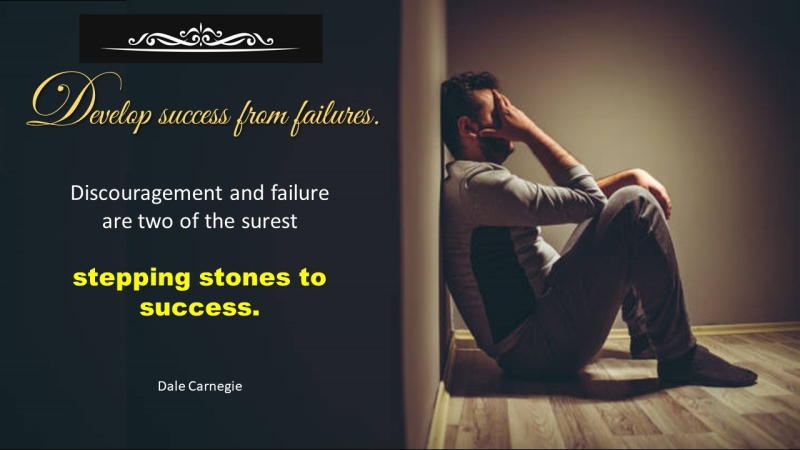FAILURES ARE A NATURAL PART OF LIFE. Regardless of how diligently we work, we will all encounter setbacks on the road to success. However, their attitude toward failure separates those who truly succeed from those who don’t. Rather than seeing failure as a roadblock, successful people use setbacks as stepping stones to reach even greater heights. This is the concept of “fail forward.”
Failure can help us succeed, which may seem counterintuitive at first glance. But in reality, it is through loss that we learn some of our most valuable lessons. When we fail, we must reflect on what went wrong. This thinking about ourselves helps us find our weaknesses, improve our plans, and, in the end, grow as people.
As you continue reading this article, I invite you to adopt a new perspective on failure. Rather than fearing it or avoiding it at all costs, I challenge you to see failure as an opportunity to learn and improve. The advantages of setbacks will be discussed further, along with how to “fail forward” and real-life examples of individuals who have turned setbacks into successes. Get ready to embrace failure and discover how it can lead you toward your ultimate goals!
The Benefits of Failure
It’s no secret that failure can be tough to handle. Failure can make us feel down, frustrated, and defeated, whether a minor setback or a big disappointment. However, let’s shift our perspective and see failure as an opportunity for growth. In that case, we can unlock some truly unique benefits.
Here are just a few of the positive aspects of failure that can help us succeed:
- Building resilience and perseverance: When we face obstacles and setbacks, we must dig deep and find the strength to keep going. Over time, this resilience and determination can become powerful tools that help us overcome even the toughest challenges.
- Providing opportunities for learning and growth: Failure often teaches us more than success ever could. By analyzing our mistakes and learning from our failures, we can gain valuable insights and develop new skills to serve us well.
- Fostering creativity and innovation: When we hit a roadblock, we must think outside the box and develop new solutions. This creative thinking can lead to innovative ideas and breakthroughs that wouldn’t have been possible without failure.
Successful People Who Experienced Failure on Their Way to Success
And the best part? These benefits are not just theoretical – they have been proven time and time again by successful people who have experienced failure on their way to the top. Just consider some of the most famous examples:
- Thomas Edison made thousands of attempts to perfect the light bulb.
- J.K. Rowling endured rejection by numerous publishers before Harry Potter became a global phenomenon
- Michael Jordan was not allowed to play basketball for his high school before becoming one of the greatest players ever.
As you can see, failure is not a roadblock but a stepping stone toward success. Don’t give up the next time you encounter an obstacle. Instead, see it as an opportunity to build resilience, learn and grow, and tap into your creativity and innovation. With the right mindset, failure can be your friend on the road to success.
How to “Fail Forward”
Now that we understand the benefits of failure let’s talk about adopting a “fail forward” mindset and turning setbacks into stepping stones toward success.
Here are some ways to view setbacks as learning opportunities:
- See failures as learning opportunities: Instead of beating yourself up over mistakes or setbacks, approach them with curiosity and openness. Think to yourself, “What can I take away from this?” What worked well, and what could I improve next time? By viewing failures as a chance to learn and grow, you can transform them into valuable knowledge that will aid your future endeavors.
- Accept responsibility for mistakes and use them to improve: It can be tempting to blame external factors when things don’t go as planned, but the most successful people take ownership of their mistakes and use them as fuel for improvement. When you run into trouble, stop and think about how you could have avoided the outcome. Then, use that insight to adjust your approach and improve your chances of success in the future.
- Stay optimistic and persistent in the face of setbacks: Failure can be discouraging, but the most successful people know how to stay happy and steady in the face of setbacks. Rather than giving up or becoming disheartened, please don’t lose sight of your end goal and stop progressing. Keep in mind that failures are an inevitable part of any worthwhile endeavor. With each setback, you learn something new and move closer to success.
Implementing these strategies may be challenging, but they can become powerful tools for success with practice. Some pointers to get you going are as follows.
- Write down your thoughts and feelings as you go along in a journal. Seek feedback from others to gain new insights and ideas for improvement.
- When things get rough, it helps to have people around who will encourage you to keep going.
By adopting a “fail forward” mindset and implementing these strategies, you can transform setbacks into stepping stones and achieve tremendous success than you ever thought possible.
Case Studies of “Fail Forward”
To “fail forward” successfully, studying the experiences of those who have gone before can be helpful. Here are a few inspiring stories of individuals and organizations that turned setbacks into stepping stones toward success:
- Walt Disney: Before he became one of the most successful animators in history, Walt Disney faced numerous setbacks and failures. His first animation company went bankrupt, and he was fired from his job as a newspaper cartoonist for “lacking imagination.” Despite these setbacks, Disney remained committed to his vision and worked tirelessly to bring his ideas to life. Today, his creations – from Mickey Mouse to Disneyland – are beloved by millions worldwide.
- Steve Jobs: The co-founder of Apple Inc. is known for his many successes but faced numerous failures and setbacks. He was fired from his own company in 1985, only to return years later and help lead it to even greater success. Jobs famously said, “I didn’t see it then, but it turned out that getting fired from Apple was the best thing that could have ever happened to me. It freed me to enter one of the most creative periods of my life.”
- Airbnb: The popular vacation rental platform was born from a series of failures and setbacks. Co-founders Brian Chesky and Joe Gebbia struggled to pay rent on their San Francisco apartment. They turned their living room into a “bed and breakfast” to make some extra money. They quickly realized a demand for affordable, unique lodging options, and Airbnb was born. Despite early setbacks and a slow start, the company is now worth billions of dollars. It has changed the way people travel around the world.
Notable Insights to Learn
What do these stories have in common? They all demonstrate the power of resilience, persistence, and a willingness to learn from failure. These people and groups had a lot of success because they saw setbacks as opportunities and didn’t give up when things didn’t go their way.
So, what can we learn from their examples? Here are a few key takeaways:
- Don’t let failure define you: Consider this a chance to develop and grow as a person instead.
- Stay committed to your vision: Even in the face of setbacks, stay true to your goals and keep pushing forward.
- Be open to new ideas: Sometimes, failure can lead you in unexpected directions and open up new possibilities you never even considered.
By applying these lessons to your own life and career, you, too, can “fail forward” and turn setbacks into stepping stones toward tremendous success.
Conclusion
Failures are a natural part of life. Adopting a “fail forward” mindset can help you turn setbacks into stepping stones toward success. Here is a quick summary of the article’s most important points:
- “Fail forward” is the concept of using failures as opportunities for growth and learning.
- Failure can build resilience and perseverance, provide opportunities for learning and growth, and foster creativity and innovation.
- To adopt a “fail forward” mindset, it’s vital to see failures as learning opportunities, accept responsibility for mistakes, and stay optimistic and persistent in the face of setbacks.
- Real-life case studies, such as those of J.K. Rowling and Steve Jobs, show that failures can lead to great success if handled correctly.
- Finally, remember that failures are merely speedbumps on the road to success, not final destinations.
So, instead of giving up when you fail, consider it a step toward success. Remember, every failure is a learning opportunity that can make you stronger and wiser. So keep striving, keep pushing, and keep failing forward!
CLICK THE IMAGE TO LEARN MORE




